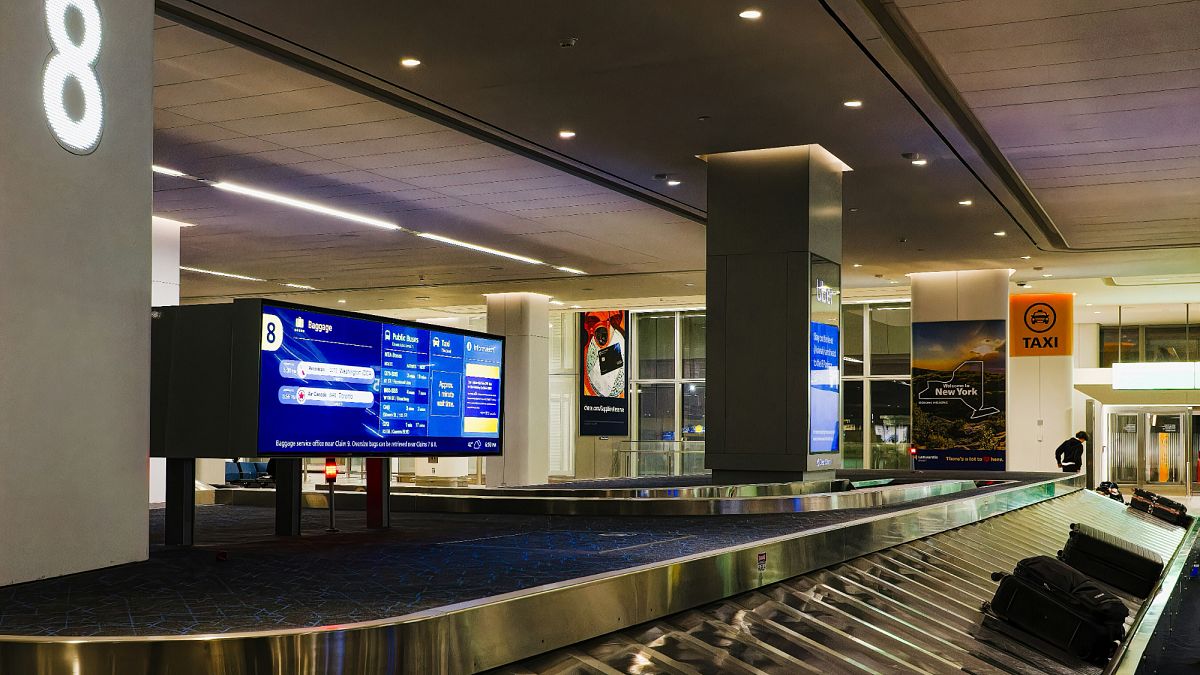The number of bags airlines lost dropped last year, thanks to tech innovations being used by the aviation industry, a new report has found.
A record 5.3 billion passengers took flights in 2024. These numbers come with logistical challenges, not least the pressure on baggage handling systems.
But there’s good news for travellers on that front. A new report from aviation technology company SITA shows that baggage handling is not just keeping pace but is steadily improving.
Even with passenger numbers up by 8.2 per cent, the rate of luggage mishandling dropped to 6.3 per 1,000 passengers in 2024, down from 6.9 the year before.
That’s an 8.7 per cent improvement from 2023, and a 67 per cent drop since 2007.
Experts say automation and data are doing the heavy lifting, from self-service bag drops to real-time tracking.
Mishandled baggage costs airlines €4.3 billion annually
According to the report, 33.4 million bags were mishandled in 2024. The group describes this as “a clear signal that while progress is real, the work is far from done.”
The financial impact remains substantial, however. Mishandled baggage still costs airlines an average of $5 billion (€4.3 billion) each year.
“Technology has made a difference, but unlocking the next leap in performance will require better data sharing and seamless coordination across the industry,” SITA says.
Self-service bag drops and electronic tags
The report found that automation and real-time data are the key to unlocking faster, more accurate baggage operations.
Travellers are now more likely to find technology handling their bags at airports from the get-go.
Touchless, self-service bag drops and tracking via electronic tags, the Internet of Things, and GPS are becoming widespread.
Today, 42 per cent of passengers use real-time baggage tracking. By 2027, that number is expected to nearly double to 82 per cent.
One of the most notable innovations in 2024 was the integration of Apple’s Share Item Location feature with SITA’s lost or delayed baggage tracking system, allowing passengers to share their AirTag location directly with airlines.
British Airways, Lufthansa, Qantas, Cathay Pacific, and Virgin Atlantic were among the early adopters.
Another milestone was the introduction of new industry standards for messaging about baggage, which are designed to reduce mishandling by a further five per cent by shifting the focus from simply reporting issues to predicting and preventing them.
Baggage handling should be ‘as reliable as a delivery app’
Regionally, performance is improving across the board. North America’s mishandling rate improved by 4.5 per cent with 5.5 per cent of bags lost per 1,000 passengers, better than pre-2019 levels.
Europe reduced its rate to 12.3 (from 15.7 in 2022), while Asia-Pacific maintained its global lead with just 3.1 mishandled bags per 1,000 passengers. That still means, however, that you are more than twice as likely to face problems in Europe than in other parts of the world.
Another result of this technological advance is that of the 33.4 million mishandled bags, 66 per cent were resolved within 48 hours.
While you may be more likely to face problems in the first place, Europe led the way by returning 4.4 million bags within 48 hours. The Americas followed with 3.2 million, while Asia-Pacific and the Middle East and Africa each resolved over a million within the same time frame.
According to SITA, continued improvement will require systems that connect every player – airlines, airports, ground handlers, and passengers – through intelligent, real-time data flows.
“With passenger expectations rising, baggage can no longer be treated as a back-end logistics function,” the report states. “It’s a critical part of the journey, expected to work as intuitively and reliably as a rideshare or delivery app.”
